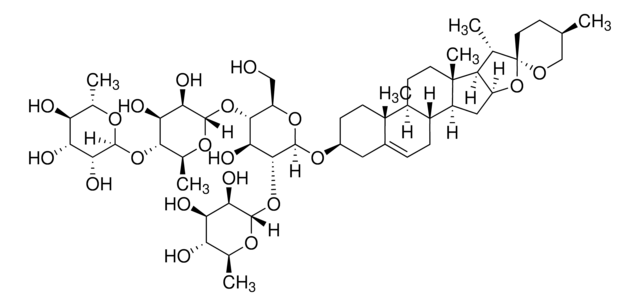47036
Saponina
for molecular biology, used as non-ionic surfactant
Sinonimo/i:
Glycosides, Saponins
About This Item
Prodotti consigliati
Grado
for molecular biology
Livello qualitativo
PM
1000-2000 g/mol
Composizione
Sapogenin, 8-25%
tecniche
HPLC: suitable
protein quantification: suitable
CMC
0.001-0.01%
Densità
1.015-1.020 g/mL at 20 °C (5% in H2O)(lit.)
Attività estranea
DNase, RNase, Protease, Phosphatase, none detected
Stringa SMILE
C[C@]1(CCC23COC4([C@H]2C1)CC[C@@H]5[C@]6(CC[C@@H](C(C6CC[C@]5([C@@]4(C[C@H]3O)C)C)(C)C)O[C@H]7[C@@H]([C@H]([C@H](CO7)O[C@H]8[C@@H]([C@H]([C@@H](CO8)O)O)O)O[C@@H]9[C@@H]([C@H]([C@@H]([C@H](O9)CO)O)O)O)O[C@H]1[C@@H]([C@H]([C@@H]([C@H](O1)CO)O)O)O[C@@H]1[C@@H]([C@H]([C@@H]([C@H](O1)CO)O)O)O)C)C=O
InChI
1S/C58H94O27/c1-52(2)29-7-11-55(5)30(8-12-58-31-15-53(3,22-62)13-14-57(31,23-77-58)32(64)16-56(55,58)6)54(29,4)10-9-33(52)82-50-46(85-51-45(40(71)37(68)27(19-61)80-51)84-49-43(74)39(70)36(67)26(18-60)79-49)44(83-48-42(73)38(69)35(66)25(17-59)78-48)28(21-76-50)81-47-41(72)34(65)24(63)20-75-47/h22,24-51,59-61,63-74H,7-21,23H2,1-6H3/t24-,25-,26-,27-,28+,29?,30-,31+,32-,33+,34+,35-,36-,37-,38+,39+,40+,41-,42-,43-,44+,45-,46-,47+,48-,49-,50+,51+,53-,54+,55-,56+,57?,58?/m1/s1
MAEBCGDGGATMSC-OSHGGGOQSA-N
Cerchi prodotti simili? Visita Guida al confronto tra prodotti
Descrizione generale
Applicazioni
- in phosphate-buffered saline (PBS) to block cells for immunocytochemistry and confocal microscopy
- to permeabilize cells for measuring total mitochondrial mass
- as an internal control to extract saponin Holothuria nobilis Selenka
Azioni biochim/fisiol
Avvertenze
Warning
Indicazioni di pericolo
Consigli di prudenza
Classi di pericolo
Eye Irrit. 2 - STOT SE 3
Organi bersaglio
Respiratory system
Codice della classe di stoccaggio
11 - Combustible Solids
Classe di pericolosità dell'acqua (WGK)
WGK 2
Punto d’infiammabilità (°F)
Not applicable
Punto d’infiammabilità (°C)
Not applicable
Dispositivi di protezione individuale
dust mask type N95 (US), Eyeshields, Gloves
Certificati d'analisi (COA)
Cerca il Certificati d'analisi (COA) digitando il numero di lotto/batch corrispondente. I numeri di lotto o di batch sono stampati sull'etichetta dei prodotti dopo la parola ‘Lotto’ o ‘Batch’.
Possiedi già questo prodotto?
I documenti relativi ai prodotti acquistati recentemente sono disponibili nell’Archivio dei documenti.
I clienti hanno visto anche
Il team dei nostri ricercatori vanta grande esperienza in tutte le aree della ricerca quali Life Science, scienza dei materiali, sintesi chimica, cromatografia, discipline analitiche, ecc..
Contatta l'Assistenza Tecnica.















